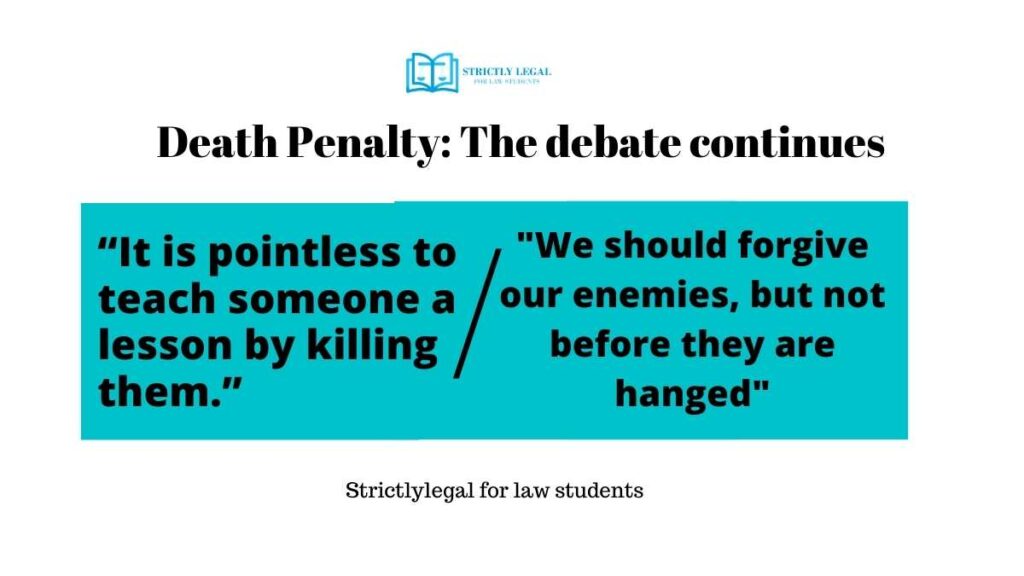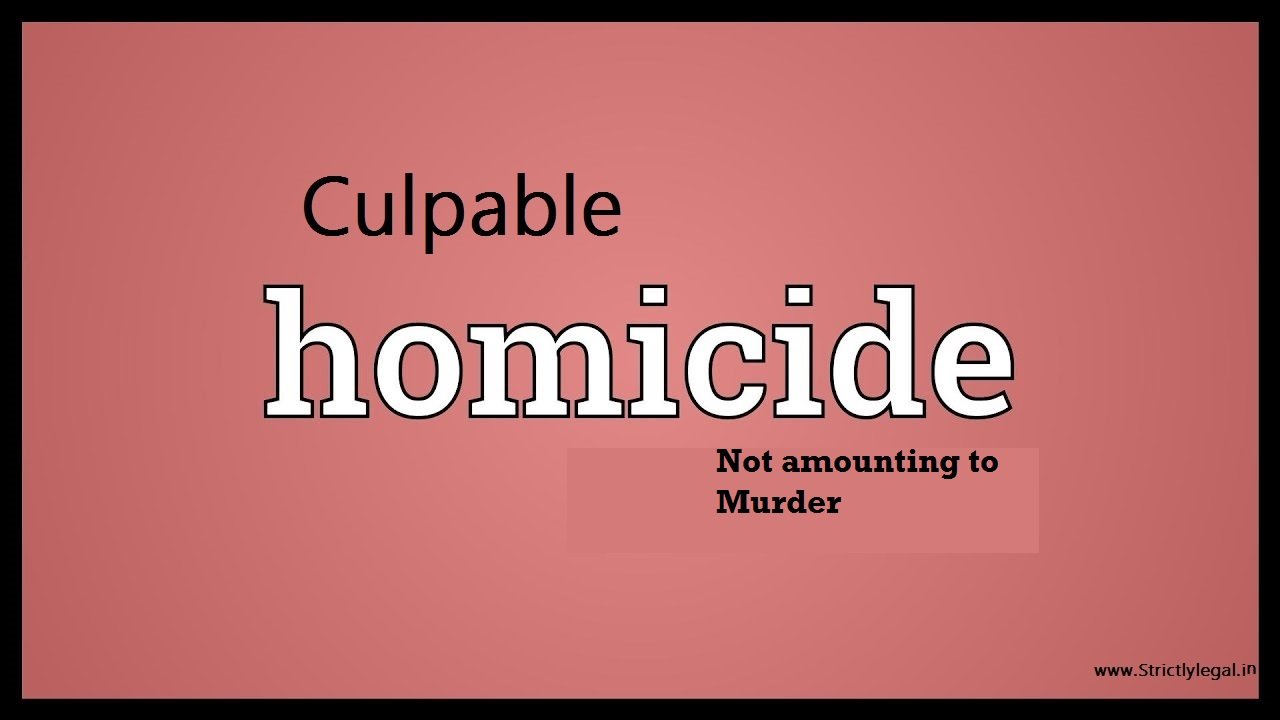“The most powerful case in favor of capital punishment is the claim of justice: Some crimes are so heinous that the only proportionate punishment, the only fitting retribution, is death. This is not a claim to be taken lightly. One purpose of the law is that it ensure that evil be appropriately repaid, that justice be done.”
― Charles Krauthammer, The Point of It All: A Lifetime of Great Loves and Endeavors
Every person has an inherent right to life and personal liberty and the same cannot be taken away except according to the procedure established by law states article 21 of the Constitution of India.
The punishment of death penalty finds its niche here. Although, this punishment is rarely awarded as the judge is conscious of the burden that this punishment carries with itself. The debate between abolishers and retentioners of the death penalty has been going on for long.
On one hand, it is deemed inhuman and against human rights which have been granted to every single person on this planet by the Universal Declaration of Human Rights. On the other hand, it is proposed that some crimes are such that there is so other punishment as fit as the death penalty for e.g. crimes against women, innocent children, and calculated gruesome crimes that shakes the conscience of a person, etc., it acts as a deterrent for others.
Worldwide, most countries have passed resolutions abolishing death penalty but some countries like China, India, and United States of America, etc. have retained it. Recently, India has voted against the United Nations General Assembly resolution for the abolition of death penalty.
While justifying their vote, India stated that the laws and the Constitution provide the platform for punishment of death penalty. The Judiciary has also held punishment of death penalty as constitutionally valid.
The Supreme Court in Bachan Singh v. State of Punjab, 1980 (2 SCC 684), penned down the concept of ‘rarest of rare’ category for awarding death penalty in certain crimes like terrorism, heinous crimes against women and children, etc.
Further, the current scenario doesn’t allow any major change in the punishments, it cannot be said that laws are lacking rather it is their implementation that needs improvement. It must also be taken into account that without discussing the heinous crime which occurred in 2012 i.e., this Nirbhaya rape case, this debate will be incomplete.
This was ‘the crime’ which brought about major amendments in the Criminal Justice System in 2013. Despite all the rage worldwide, it took eight years to finally punish the accused involved in this case. Since then, there have been many cases equally brutal and outraging.
The latest example is the gang-rape and killing of Hyderabad based vet, aged 26 years old in 2019. Her badly burnt body was found in the morning and four accused were arrested in relation to the case. The news comes after a few days that the four accused were killed in an encounter after they tried to run away.
The question is after seven years of Nirbhaya and six years after amendments in criminal law were brought in…Why are these offences still increasing at an alarming rate?
People did rejoice and believed that justice was done, but was it really justice? Will every convict of heinous crimes such as these will have the same fate and having such fate, will it change the actions of people in the society?
Does death penalty do any good? These are the questions that needs deep introspection.
Generally, all the laws over the world are accused centric and often victims are forgotten. Same is the case in India, the laws are focused the accused and his rights but the victim is often forgotten after initial steps into the trial. During trial, a public prosecutor is appointed to fight the case from the side of the victim. A public prosecutor is already having a lot of cases to deal with and often the case is sidelined by those cases which are deemed important by him.
While awarding punishment as well, victim’s injuries, expenses, and life, in general, are not taken into account. This gives rise to double victimization and the victim starts blaming itself for the offence. To justify the rights of the victim as well, death penalty is proper.
The 262nd Law Commission report chaired by former Justice A.P Shah, while pointing out the lacunas prevalent in our justice system, recommended abolishing of death penalty for all offences other than terrorism-related offences. Though it is just a recommendation, it is not binding upon the government.
Death penalty has lost its deterrent factor due to a slow justice system and even slower investigation. The problem is not in the laws, Indian laws are not weak but their implementation is dependent upon the person or government in power.
As a developing nation, India has to bring a lot of change in its mindset. Carrying out the investigation diligently within a prescribed time frame, trial to be completed within a time frame and strict implementation of laws is the need of the hour. Execution of laws should not be reliant upon the class or status of offenders, this is the area where rights provided under our Constitution are violated.
Delay in completing the trial is not the only denial of justice to the victim but to the accused as well. Before taking any concrete step regarding death penalty, one should see whether India, as a nation, is ready to wipe out death penalty from its statutes. Major changes would be needed to be done including bringing about changes in the Constitution of India.

Users not registered with Strictlylegal can Email us their content and the same are posted through this account. In case of abuse, kindly let us know at [email protected]







If death penalty is truly about teaching a lesson then surely it fails to do so, let alone act as a deterrent.
Why isn’t the justice system allowed to do the same thing to them as they did to others? Let them go through the same agony as they brought onto their victims. Why does the justice system focus on taking the moral high ground instead of delivering justice, which is its very reason for existence?
Only then will it send the exact message of deterrence.
Hi Kalbir,
You’ve raised some important questions here. I’d like to answer them from my perspective.
1. Why isn’t the justice system allowed to do the same thing to them as they did to others? Let them go through the same agony as they brought onto their victims.
> Well, I think there has to be some fundamental difference between the wrongdoer and protector i.e state. We have to understand that revenge is not the justice one should seek. Rather, uniform punishments will sustain a more civilized society.
2. Why does the justice system focus on taking the moral high ground instead of delivering justice, which is its very reason for existence?
>Again, I’d like to reiterate that Justice and Revenge are not the same things. They are very different and something, rarely though they may overlap.
Hope my answer helps.
🙂
Death penalty to be imposed on the person involved in kids human trafficking